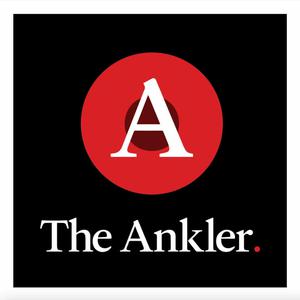
The Ankler Podcast
TheAnkler.com
Don't eat lunch in this town without it
- 43 minutes 13 secondsL.A. Production Spiral. Trump to the Rescue?
Can Jon Voight save Hollywood? Probably not. But President Trump’s announcement that the Midnight Cowboy, Mad Max (Mel Gibson) and Rocky (Sylvester Stallone) would be his “special envoys” in L.A. on the eve of his inauguration followed the latest report on L.A.’s continued production exodus. Sean McNulty, Elaine Low and Richard Rushfield dissect the numbers and where the industry is heading in 2025. Plus: How is Gen Z outfoxing studio and streaming marketers? Matthew Frank explains.
Learn more about your ad choices. Visit megaphone.fm/adchoices
17 January 2025, 8:30 am - 33 minutes 59 seconds‘An Intense Couple of Days’
“Everybody was feeling really optimistic going into this year,” says Elaine Low — and while there are encouraging signs for Hollywood, from new business models to a return to the fundamentals, she and Richard Rushfield tell Sean McNulty about friends who have lost homes, Richard’s memories of growing up in Pacific Palisades, and Elaine’s anxiety over suddenly preparing a go-bag. On a lighter note: They also dissect their night at Netflix’s WWE Raw premiere — with Richard announcing whom he’ll be fighting at the next WrestleMania.
We’re collecting stories of how the entertainment community is coping with the Los Angeles fires. Submit yours here.
Learn more about your ad choices. Visit megaphone.fm/adchoices
10 January 2025, 5:30 pm - 1 hour 3 minutesTales From the ’90s: How New Line Dominated the Decade
For the capstone of his Hollywood Stories series exploring the 1990s — an era of explosive creativity and innovation in the entertainment industry — Richard Rushfield talks to two execs who helped New Line Cinema become the movie studio of that golden moment. Mike De Luca is today the co-chair and CEO of Warner Bros. Motion Picture Group, but in the ’90s he was the head of production at New Line, a powerful role he stepped into at the tender age of 27. Richard Brener started as a temp at New Line in 1995 and never left, working his way up to run the studio (now a division of Warner Bros.) as its president and chief creative officer. Together they recall how the indie house launched by Bob Shaye in 1967 struck gold nearly 30 years later with comedy blockbusters (Austin Powers, Dumb and Dumber, Rush Hour, The Wedding Singer) and revered auteur-driven dramas (American History X, Boogie Nights, Se7en). As an indie, "you were kind of locked into lower-budget acquisitions and films — that all coalesced into a business plan of sleeper hits," De Luca says. “We were not afraid of trying things that we liked, even if other people had passed on them.”
Learn more about your ad choices. Visit megaphone.fm/adchoices
6 January 2025, 8:30 am - 40 minutes 23 secondsLively vs. Baldoni: Lawsuits! Exposés! Rumors!
Blake Lively alleges a full-on smear campaign aimed against her. Justin Baldoni claims the star of his It Ends With Us used the New York Times to destroy his reputation. Sean McNulty, Elaine Low and Richard Rushfield discuss the fallout of the feud heard round the world, the YouTube journalist roped into the ruckus, and why Richard boils it all down to typical Hollywood bluster. Plus: The crew breaks down how animation and IP defined the 2024 box office.
Learn more about your ad choices. Visit megaphone.fm/adchoices
3 January 2025, 8:30 am - 57 minutes 23 secondsTales From the ’90s: Ain’t It Cool News’ ‘Titanic’ Impact on Hollywood
At the dawn of the internet as we know it today, long before social media exploded the Hollywood hierarchy, there was Ain’t It Cool News, an in-your-face site, launched in 1996, that covered the movie business — passionately, disruptively and absolutely without fear or favor. Drew McWeeny, who joined Harry Knowles’ Austin startup in its earliest days, writing from L.A. under the pseudonym Moriarty, tells Richard Rushfield how Ain’t It Cool News remade entertainment journalism, confounded the studios and enraged execs from Tom Rothman to Rupert Murdoch. Among other breaks with industry-coverage norms, McWeeny and his colleagues were the first to publish reports and reviews from test screenings, changing the fortunes of films including Batman & Robin and, most famously, Titanic. “I was addicted to Premiere, Movieline, all those magazines,” McWeeny recalls. “But it was all very carefully stage managed with the studios, and it had to be. We were the response to that, which was the most punk rock version of: No, not only do we not deal with the studios, but fuck the studios.”
Learn more about your ad choices. Visit megaphone.fm/adchoices
30 December 2024, 8:30 am - 38 minutes 54 secondsTrends Giving Us Hope in 2025. Seriously
One sure precursor to any Golden Age in Hollywood? A long fallow period preceding it, not unlike the one we’ve been in. Now, with a spec market for originals coming back to life, and fresh opportunities for producers and writers to make money through YouTube, branded content, podcasts and yes, AI, Sean McNulty, Elaine Low, Richard Rushfield and Janice Min take stock of where the industry is heading in 2025 with cautious optimism. Plus: The gang dissects the Blake Lively-Justin Baldoni smear campaign revelations.
Learn more about your ad choices. Visit megaphone.fm/adchoices
27 December 2024, 8:30 am - 37 minutes 50 secondsTales From the ’90s: Ron Meyer’s 'Miracle' Hollywood Career
From founding CAA to leading Universal Studios, Ron Meyer built one of the entertainment industry’s most storied careers. The high school dropout and former Marine talks with Richard Rushfield about his entire legendary run, especially the events surrounding the pivotal moment in 1995 when he successfully executed a maneuver that has stymied other sharks — leaving the talent ecosystem (and ending his partnership with CAA cofounder Mike Ovitz — "a marriage gone kind of sour”) to become a studio head. He also recalls what lured him to Hollywood ("I want to be the guy in that fast car with beautiful women"), the “ferocious” competition between his agency and William Morris, his “tug-of-war” with Barry Diller at Universal (where he lasted 25 years and survived six owners), the movies he’s proudest of and why he’s still an optimist about showbiz. “To the day I left Universal, I pinched myself,” he says of his Hollywood journey, which ended with his exit from the studio in 2020. “I always thought it was a miracle.”
Learn more about your ad choices. Visit megaphone.fm/adchoices
23 December 2024, 8:30 am - 41 minutes 43 secondsA New Spec Script Boom Catches Fire
Writers are getting paid $1 million or more on so-called “naked” scripts — no IP, actor or director attached. It may sound like Shane Black’s 1990s, but it’s happening right now as Nicole LaPorte joins Sean McNulty and Elaine Low to reveal a fast change in the market (thanks, Dan Lin!), and the kinds of scripts selling (think Sherry Lansing). Plus: Lachlan Cartwright talks his massive scoops from TV news, including MSNBC’s plan for more conservative voices, pay cuts for big on-air faces, and fears over ABC News’ Trump settlement.
For more entertainment news, subscribe to The Ankler or apply to The Ladder, a new members-only hub for early career entertainment professionals.
Learn more about your ad choices. Visit megaphone.fm/adchoices
20 December 2024, 8:30 am - 1 hour 7 minutesTales From the ’90s: Before ‘Wicked,’ Winnie Holzman’s ‘My So-Called Life’ Changed TV
Richard Rushfield sits down with Winnie Holzman, creator of the beloved but short-lived teen drama My So-Called Life, which ran for one 19-episode season from 1994-95 and later became a cross-generational cult hit. The show that launched Claire Danes and Jared Leto also captured adolescent angst onscreen in a totally new way — “School is a battlefield for your heart,” anyone? — that made ABC execs “deeply nervous,” says Holzman, though she was fiercely protected by her EPs and mentors, Marshall Herskovitz and Ed Zwick. A student of poetry and the Stanislavski system, Holzman, in a candid, hilarious and nostalgic conversation, unpacks the emotion and humor that propelled her through multiple 1990s TV successes to the Broadway hit Wicked (she wrote the book of the musical) and its two-part film adaptation, whose first installment is in the Oscar hunt.
Learn more about your ad choices. Visit megaphone.fm/adchoices
16 December 2024, 8:30 am - 37 minutes 45 secondsJoe Rogan Helped Trump Win. Now He’s Conquered Comedy
Pro-free speech, anti-trans, anti a lot of things, the standup comedians who made their bones on The Joe Rogan Experience podcast — from Theo Von to notorious Trump rally opener Tony Hinchcliffe — are rewriting how big comics can get without movies and TV. Ankler contributor Lachlan Cartwright joins Sean McNulty to discuss why Gen Z loves these guys and how these comics’ reps are building multi-million-dollar constellations around these dark stars. Plus, Elaine Low, Richard Rushfield and Sean explore WBD’s “enhanced strategic flexibility” as studios decide now is finally the time to “see what we can do with our cable networks.”
For more entertainment news, subscribe to The Ankler or apply to The Ladder, a new members-only hub for early career entertainment professionals.
Learn more about your ad choices. Visit megaphone.fm/adchoices
13 December 2024, 10:53 pm - 1 hour 21 minutesTales From the ’90s: ‘Last Action Hero’ Screenwriters Tell All
In this new Ankler series, Hollywood Stories, we are starting with wild untold showbiz tales from the '90s. For our debut episode, Richard Rushfield sits down with Adam Leff and Zak Penn, the original screenwriters behind one of film's most iconic flops, Last Action Hero. Speaking publicly together for the first time about the screenplay they sold when they were just out of college 30 years ago, they recall the highs — a heady bidding war, a yes from megastar Arnold Schwarzenegger — and the cascading humiliations of the misbegotten project, which became a superlatively excessive and lousy product of the bloated Hollywood machine it was originally meant to parody.
Transcript here. For more entertainment news, subscribe to The Ankler or apply to The Ladder, a new members-only hub for early career entertainment professionals.
Learn more about your ad choices. Visit megaphone.fm/adchoices
9 December 2024, 7:34 pm - More Episodes? Get the App
Your feedback is valuable to us. Should you encounter any bugs, glitches, lack of functionality or other problems, please email us on [email protected] or join Moon.FM Telegram Group where you can talk directly to the dev team who are happy to answer any queries.
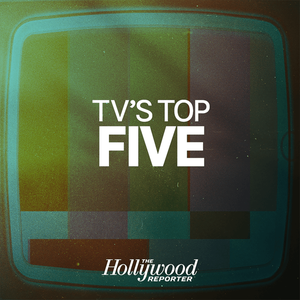 TV's Top 5
TV's Top 5
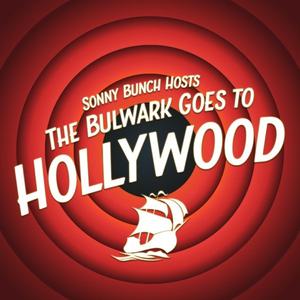 The Bulwark Goes to Hollywood
The Bulwark Goes to Hollywood
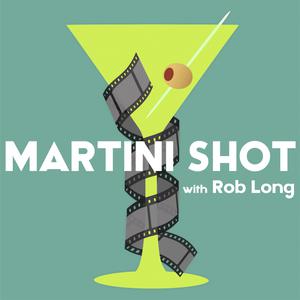 Martini Shot
Martini Shot
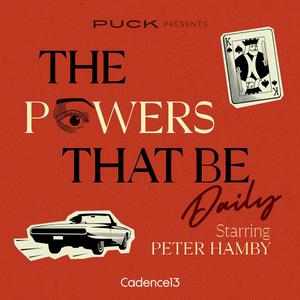 The Powers That Be: Daily
The Powers That Be: Daily
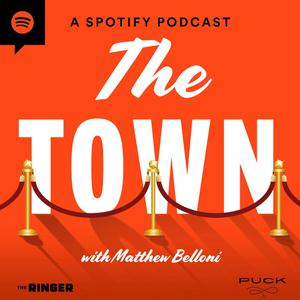 The Town with Matthew Belloni
The Town with Matthew Belloni
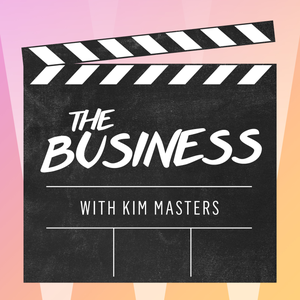 The Business
The Business